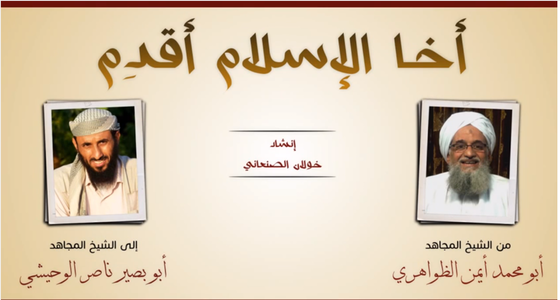Leaders in al Qaeda in the Arabian Peninsula (AQAP) released two messages in early July. The first, from AQAP emir Nasir al Wuhayshi, heaps praise on al Qaeda head Ayman al Zawahiri, calling him the "sheikh father" of the mujahideen. The second, a video starring two leading AQAP ideologues, appears to be a critique of the Islamic State and its supporters.
Al Qaeda members online view the two messages as replies to recent claims made by the Islamic State, which declared in late June that it is a caliphate and its leader, Abu Bakr al Baghdadi, is now to be known as "Caliph Ibrahim." The Islamic State's caliphate announcement was a direct challenge to al Qaeda's and Zawahiri's authority among jihadists.
Wuhayshi's tribute to Zawahiri is in the form of a poem, which was accompanied by a jihadist anthem. Both the poem and the anthem were posted online on a twitter feed (@bashaer_Audio) that releases AQAP audio productions.
"He carried the flag in his youth, middle age, and old age and till this very day he continues to hold fast to it," Wuhayshi says of Zawahiri. The AQAP head goes on to describe Zawahiri as a "skillful teacher, seasoned veteran, and expert commander," who "was nursed by wisdom and reveled in it." Zawahiri "was taught by wars" and "is the second wise man of jihad," with Osama bin Laden presumably being the first. Zawahiri "is the apple of the eyes of mujahideen of this time" and "the theorist of the jihadist movement, its orator" and its "Sheikh father."
In addition to serving as AQAP's emir, Wuhayshi was named al Qaeda's general manager in the summer of 2013. The position gives Wuhayshi, who served as bin Laden's aide-de-camp prior to the 9/11 attacks, broad power across al Qaeda's international network.
AQAP video denounces "slander" of jihadist leaders
The AQAP video was released shortly after Wuhayshi's poem and features a pair of leading ideologues, Harith bin Ghazi al Nadhari and Ibrahim al Rubaish. The production is entitled, "Responsibility of the Word." Both men defend the reputations of unnamed jihadist "scholars" and warn against "slandering" them. Although they don't mention specific events, it appears that the AQAP ideologues are addressing the vicious infighting between the Islamic State and its rivals in Syria.
"The flesh of the scholars is poisoned ... so backbiting the scholars, the people of favor and goodness, contains much evil," Nadhari warns, according to a translation by the SITE Intelligence Group. "Devaluing the people of goodness and righteousness, and the people of knowledge and favor, is not from the teachings of Islam," Nadhari continues. "Among the teachings of Islam is to dignify the Muslim with gray hair: he has nothing, he has done nothing, and he is just a faithful Muslim. Although he is not from the people of favor, to dignify this good man, this faithful man, because he grew up with Islam, is among teachings of the religion."
Nadhari goes on to describe this unnamed man as having "gray hair" and being "very old," and as having "a lot of experience." The description could easily apply to Zawahiri, as well as to other leading jihadist thinkers who have been critical of the Islamic State's unilateral claims to power. "So respecting the ranks of those people and their positions is a great matter and it is from the teachings of Islam," Nadhari concludes.
Rubaish echoes Nadhari's warning. "Instead of sanctifying the scholars, disrespecting the scholars is found, and slandering them, and speaking badly about them for whatever reason, even in disputes," Rubaish says, according to SITE's translation. "This is among the calamities" experienced by jihadists today, Rubaish says. "We are not talking about the evil scholars who are known for supporting the tyrants, but those scholars who we consider and Allah knows them better, to be pious and to be those who speak the truth aloud."
Rubaish blasts jihadists who restrict "the religion ... to certain issues," making "those who concur" with them "loyalists and brothers," while disavowing those who disagree.
Nadhari is an increasingly important jihadist thinker. In addition to having his work promoted by AQAP, Nadhari's writings have been featured in Nawa-e-Afghan Jihad ("Voice of the Afghan Jihad"), a magazine that publishes the works of top al Qaeda leaders and their closest allies. The July edition of the magazine included a piece from Nadhari on "ideology and teachings."
Rubaish is a former Guantanamo detainee. During his time in custody in Cuba, American officials identified him as an al Qaeda member. Rubaish was transferred to his native Saudi Arabia in December 2006 and entered into a jihadist rehabilitation program before being released. By late 2009, Rubaish was publicly identified as one of AQAP's leading theologians.
Praise for AQAP's messages from al Qaeda members on Twitter
The AQAP leaders do not explicitly mention the Islamic State or its leader, let alone condemn him. But the messages were quickly trumpeted on Twitter by the Islamic State's rivals in the Al Nusrah Front, which is al Qaeda's official branch in Syria.
Among the Al Nusrah Front officials who tweeted or retweeted the AQAP messages are Abu Sulayman al Muhajir and Sami al Uraydi, both of whom are senior sharia officials in the group. Abu Sulayman and Uraydi have been engaged in a heated war of words with their Islamic State counterparts.
Other al Qaeda-linked jihadists on Twitter praised the messages from AQAP as well.
On the other hand, Mamoun Hatim, an AQAP ideologue who has long supported the Islamic State, disapproved of the video featuring Nadhari and Rubaish. In a series of tweets, Hatim wondered if his comrades had witnessed the Islamic State's gains in Iraq.
Oren Adaki, a research associate and Arabic language specialist at the Foundation for Defense of Democracies, contributed to this article.

